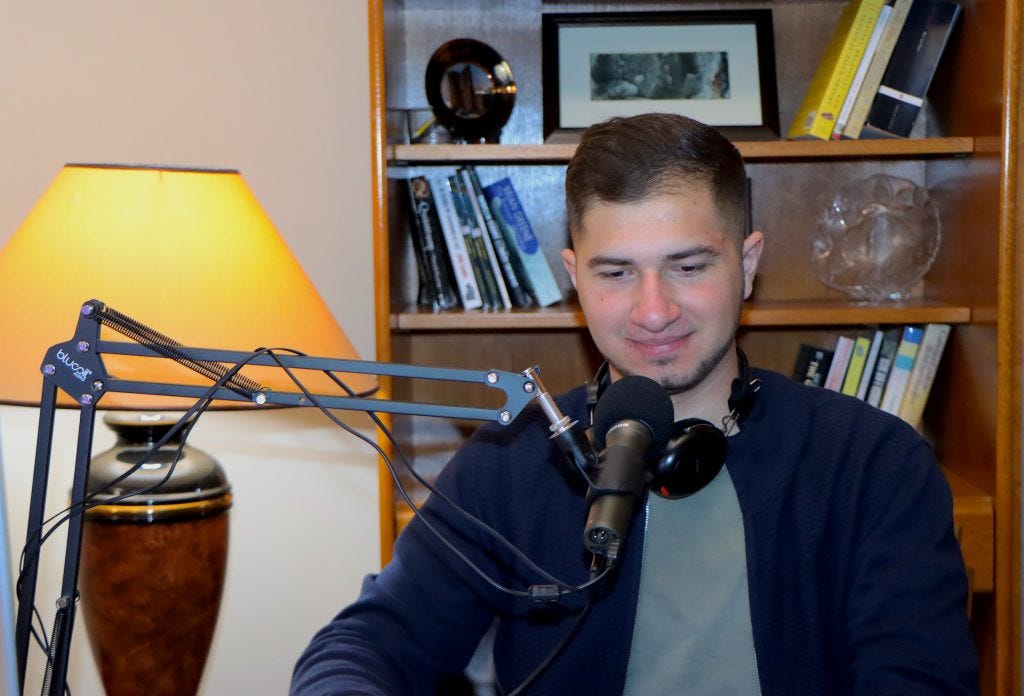Taking on the Taliban with words
As free expression disappears in Afghanistan, Mansoor Ramizy launches the Voice of Science podcast to counter censorship with open debate
Military resistance crumbled when the Taliban tore across Afghanistan in the summer of 2021, seizing city after city and claiming the capital Kabul by August 15. Desperate Afghans fled but many more were stranded, forced to face a very different future from the one they had imagined just months previously. “The Taliban’s takeover came as a shock for my generation; we had moved on from the idea of such a regime regaining power,” says Ahmed Mansoor Ramizy, who is mounting a resistance against the extremist ideologies engulfing his country
Where force failed to repel the Taliban, his weapon is words, giving Afghans access to information and ideas that the group seeks to crush. “The Taliban miseducate the young with corrupted interpretations of religion…. We aim to provide an alternative so they have the choice to think for themselves.”
With books and newspapers subject to strict censorship, Ramizy, 20, has launched a podcast – the first in Afghanistan - to provide a space for original Afghan thinkers, scientists and changemakers to share their ideas in Persian and Pashto. Supported by an Innovation Hub grant from Ideas Beyond Borders, the Voice of Science podcast makes free thinking and open discussion available to all Afghans in their native languages via platforms beyond the Taliban’s control
“Digitally Afghans still have access to the outside world,” says Ramizy, who managed to escape as the Taliban closed in and now lives in Turkey. “There’s very little space for free thinkers in Afghanistan – religion, philosophy, science, these subjects are dangerous to discuss.” Approximately 18 million people in the country own smartphones, of whom around 7.3 million are connected to the internet. “Podcasts are easy to use - they require minimum internet bandwidth, can be downloaded for free and listened to anywhere at your own pace,” he adds.
Social media platforms including Facebook, Instagram, and increasingly YouTube, are widely used as sources of information – and misinformation - in Afghanistan, but podcasts have yet to breakthrough. “We are experimenting with a whole new world of possibility here. We are showing other Afghan creators a new method and if our experiment is successful, I believe others will follow.”
The podcast is linked to a wider project run by Ideas Beyond Borders to make Wikipedia pages and books on subjects including critical thinking, science, and human rights available to all Afghans. Working with student translators, The House of Wisdom 2.0 Afghanistan project has so far translated 1100 Wikipedia articles into Pashto and 400 Wikipedia articles into Persian as part of IBB’s mission to uproot radical ideologies and provide people with the tools to think for themselves in countries where extremism and oppression stifle free speech.
“Despite constant conflict and war, many people in Afghanistan are curious to know more about the world around them. This podcast is for them. Ahmed Mansoor Ramizy is the voice of an inquisitive population that the Taliban seeks to suppress, igniting people with knowledge and hope for a better tomorrow when the doors seem to have slammed shut,” says Faisal Saeed Al Mutar, Founder and President of Ideas Beyond Borders.
Born shortly after the US invasion toppled the previous Taliban regime in 2001, Ramizy grew up in an era of relative freedom for Afghans. His circle of friends, both male and female, would meet regularly at a café in central Kabul to discuss ideas around faith, philosophy, science, and spirituality, in an atmosphere of open debate. “Overall, people were welcoming new trends, ideas, and initiatives… Those were some of the sweetest memories that I proudly carry everywhere I go,” he says.
For now, that life seems lost in Afghanistan, which operates once more under the Taliban’s strict sharia law, with men and women segregated, women’s rights severely curtailed, music banned and men forced to grow beards in recognition of the group’s uncompromising interpretation of Islam.
In this atmosphere, it’s difficult to share ideas, but he is determined to try. The spread of extremism is like “poison spilled in a pond,” Ramizy says. “The longer we wait, the more radical society becomes, poisoning generations yet to come.”





